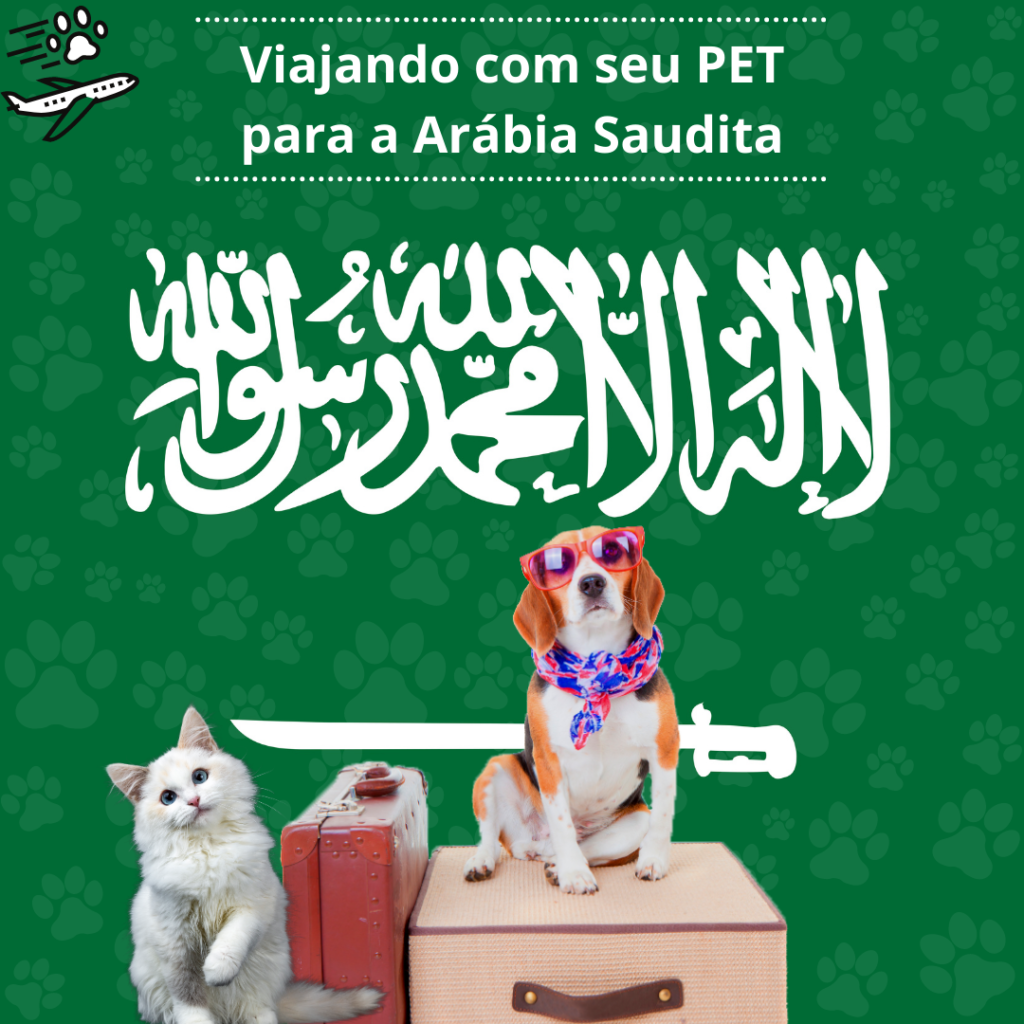
Traveling with animals to Saudi Arabia is a very complicated matter, as all the travel procedures are quite complex.
In addition to documents that other countries do not require, you face the difficulty of language and completely different culture/customs from the West.
A very particular point in the region is that all documentation must be transcribed into a sworn translation in English or Arabic.
So for you to be able to make your trip without any headache, you must pay attention to several questions.
If you want to know more about this subject, continue reading this article that the PETFriendly Turismo team has prepared for you.
What are the first steps to travel with animals to Saudi Arabia?
Saudi Arabia has many requirements when it comes to receiving pets from other countries, such as:
- Proof of identification of the animal (Microchip)
- Up to date vaccination record (Vaccination for Rabies, Lepstospirosis, Distemper, Parvovirus, Parainfluenza, Coronavirus, Adenovirus and Infectious Canine Hepatitis)
- Veterinary Health Certificate
- File all documents with the Saudi Ministry of Foreign Affairs
- Payment of fee at the Saudi Arabian Ministry of Foreign Affairs < li>Consularization of documents at the Saudi Arabian Embassy in Brazil
- Import Permit from the Saudi Ministry of Agriculture
- International Veterinary Certificate – MAPA – VIGIAGRO – Brazil.
Firstly, you should pay attention to these issues and don’t forget that everything must be sworn in English or Arabic, otherwise your PET will not be accepted.
Microchipping pets for travel to Saudi Arabia
Like many countries, traveling with animals to Saudi Arabia also requires your pet to have an identification Microchip.
This procedure must be performed by an authorized veterinarian and is considered relatively straightforward.
A small computer chip (the size of a grain of rice) is inserted into the pet’s skin, where it works as a “CPF” for the animal, containing the main information about him and his guardian.
The chosen microchip brand must meet the requirements of ISO 11784 and 11785 to be recognized worldwide and accepted by any official veterinarian abroad.
Vaccinations required to travel with animals to Saudi Arabia
For the PET to be able to enter Arab lands, it needs to have the Rabies Vaccination up to date.
Not all vaccines are accepted, for example, those from vaccination campaigns offered by City Halls or vaccines from national brands are not recognized.
Therefore, you should seek a veterinarian who will supply the imported vaccines accordingly. with the rules of the Continent.
Be careful with the ideal deadline for the application of this vaccine, so that it is not expired when the animal is boarding and can also carry out the Rabies Serology without major problems.
The “V10” vaccine is one of the most important vaccines for dogs today and is also required for travel with animals to Saudi Arabia.
It protects against the main diseases and should be applied from the 45th day of the animal’s life, with 3 to 4 doses in a row, with an interval of 21 to 30 days. After this initial procedure, it must be applied once a year.
This vaccine protects against 7 diseases: Distemper, Parvovirus, Coronavirus, Adenovirus, Parainfluenza, Infectious Canine Hepatitis and 4 types of Leptospirosis.
Serology for rabies for international travel
This is a blood test that aims to check if the animal has antibodies against the rabies virus and is required by most countries to access it.
notice the entrance of the animals.
The deadline for carrying out this is 30 days after the application of the Rabies Vaccine. Therefore, this exam must be sent to an authorized laboratory.
Here at PETFriendly, we ship our samples to the US, Kansas.
This process, in all, takes around 2 to 3 months, so you should plan so that you have enough time to have the Serology in hand.
The Serology of Rabies is not a mandatory step for animal travel to Saudi Arabia, but it is required in several other countries.
So it is always valid to do so, to have an extra guarantee and to facilitate any intercontinental locomotion.
Veterinary Health Certificate for traveling with animals to Saudi Arabia
This is a document in which the veterinarian certifies that the animal is in perfect health and vaccinations are up to date, making it fit to board a flight.
We recommend that you have a professional you trust, so this clinical evaluation will be valid and you will be free of unwanted “surprises”.
This document can be written directly in English or Arabic or it must have a sworn translation.
File all documents with the Saudi Ministry of Foreign Affairs
In order for you to be able to travel with animals to Saudi Arabia, you must file all these documents with the country’s Ministry of Foreign Affairs.
Never forget in case of doubt, the tip is to seek help at the Consulate or with a specialized company such as < strong>PETFriendly Tourism.
Payment of fee at the Ministry of Foreign Affairs of Saudi Arabia
After reviewing and validating all documents, you will need to pay a fee, due by law, to Ministry of Saudi Arabia (Ministry of Foreign Affairs of Saudi Arabia) in order to get the documentation legalized.
Consularization of documents at the Saudi Arabian Embassy in Brazil
This process consists of the legalization of documents, where all data will be included in the database of Embassies and Consulates in the country.
The Embassy of Saudi Arabia in Brazil is located in Brasília – DF, at St. of Individual Houses Sul QI 9 – Lago Sul, Brasília – DF, 70625-090.
In this process, the Consul will sign and stamp all documents sent and from there, your pet will have a large part of the permission to enter Saudi Arabia.
Import Permit from the Saudi Ministry of Agriculture
You must have an import permit to travel with animals to Saudi Arabia.
This way, when your PET arrives at its destination, it will be received by an Official Veterinarian of the local Government, who will carry out an evaluation on the animal to confirm its perfect state of health.
International Veterinary Certificate
Also called “CZI” (International Zoosanitary Certificate) is the document that guarantees the transit of animals within the sanitary rules required internationally.
This document is issued by “MAPA” (Ministry of Agriculture, Livestock and Supply) and is valid for only 10 days after its issuance.
So, you must pay close attention to the dates, so that you don’t have to carry out a new issue, generating extra costs or even having your animal denied boarding.
Means of shipping your PET to Saudi Arabia
Saudi Arabia has a completely different culture than what we are used to.
So on a flight to this region, it is possible that you will find a person carrying a Falcon in the cabin of the plane, and that your dog or cat, has to be transported in the hold, either as Live Cargo or Excess Baggage.< /p>
Animals in the Cabin
Some airlines allow the transport of animals in the aircraft cabin, as long as they are small and at least four months old or are guide dogs.
Dogs and cats must travel inside a clean, safe kennel under the seat in front of them.
For this reason, you should consult all airlines and check the specific rules for each one.
Excess baggage
When the total weight of the dog or cat plus the kennel exceeds that allowed by the airline, they must travel in the hold of the aircraft their owner is on.
Usually, airlines transport animals weighing up to 45kg and require the box to be up to 115 cm high and 300 cm linear (sum of height, width and length);
In addition, they must be made of plastic, metal or wood and the grille must be made of metal, as specified by the International Air Transport Association (IATA).
Always check airline rules or PETFriendly Turismo.
Live Charge
Some countries and airlines do not allow animals traveling in the cabin or hold of the aircraft, therefore, they require that they be shipped as live cargo.
Each airline has its own rules, so it is necessary to get all the information so that there is no problem at the time of boarding.
Difficulties of traveling with animals to Saudi Arabia

In the 3 years of PETFriendly Turismo, we were able to help some families with all the necessary procedures to embark and reside peacefully in the region.
So we had reports from clients, who from their own experience told us about the difficulties of living in Saudi Arabia.
Many foreigners residing in the country live in “COUMPOUNDS”.
These are gated communities, which in most cases are inhabited only by foreigners, and some, in fact, do not allow local people.
Another fact is that the Arabs are more fond of felines than canines. This is due to some anti-dog stories and quotes from Muhammad.
In this way, dogs are seen only as protection or hunting animals, not pets.
But that doesn’t make them prohibited and you’ll be able to find Pet Shops and places to sell food and supplies for your puppy.
On the other hand, there is a ban on some breeds in specific regions, so moving to Saudi Arabia requires a lot of study and dedication from their tutors.
How to make traveling easier?
After knowing all the steps, procedures and difficulties to travel with animals to Saudi Arabia, the difficulty of the process is verified.
And every country has similar or totally different requirements, which is why Dr. Juliana Stephani, veterinarian and founder of PETFriendly Turismo, specializes in PET travel.
To provide you with the most reliable and secure way to make your move, no matter which continent you need to move to.
Contact our team of experts and let us help you with every step of your journey.
PETFriendly Turismo, THE ONLY OPTION IS TO WORK!





You must be logged in to post a comment.